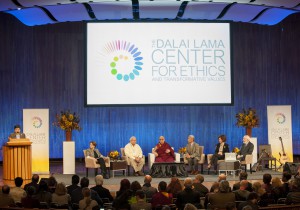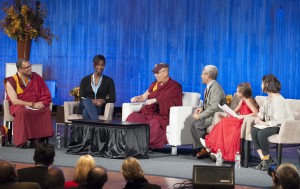HOPE AND COLLECTIVE ACTION FOR A BETTER WORLD: THE DALAI LAMA VISITS MIT
On October 31, 2014, The Dalai Lama Center for Ethics and Transformative Values invited His Holiness to join the MIT community, along with the general public, in a conversation about the collective changes we might make in order to create a better world.
The Dalai Lama conferred with scholars and activists of all ages on climate change, especially the impacts of global warming on food security and coastal communities, as well as the future of younger generations.
Hundreds of folks were eager to gather and participate in this discussion at MIT’s beautiful Kresge Auditorium. And though the event was three hours long – longer for those waiting in the cold autumn weather – it was not an event that left participants feeling the same as when they arrived. Rather, the Dalai Lama’s visit served as an initiation for audience members and the community at large, many of which were not aware of the dire environmental circumstances and the need for imminent action. In this way, the event was a threshold and now we are on the other side, inspired and committed to finding the best solutions for our environment and one another.
Of the two panel discussions, the first was entitled Global Systems 3.0: Equitable Solutions for a Changing World and began with John Sterman, a professor at MIT’s Sloan School of Management. He gave a brief, yet powerful, presentation on the current state of global warming trends and its impact on our lives in the very near future. Sterman’s message was very clear: we must act soon, but we must act collectively. No longer are our individual consumer choices or trust in elected politicians sufficient to counter the pattern we’ve allowed ourselves to fall into: massive increases of carbon emissions that, by 2090, will have grave implications on the health of our planet, and that will inevitably alter our ways of life all across the globe. For some, this may mean inconvenience, but for others, it will completely alter the ability the ability to find food, water, and adequate shelter from weather conditions that are ever increasing in severity.
But the Dalai Lama acknowledged, “It is our responsibility to look,” and when we explore this situation as a community, we see solutions that were impossible to imagine alone.
The conversation ensued, with Rebecca Henderson, Marshall Ganz, and Deborah Ancona discussing actions that various people had taken in an effort to initiate change. Henderson shared one such story, Mothers Out Front, which began when a small group of mothers expressed concern about the future state of the environment and the implications it would have on their young children. In turn, they mobilized in living rooms, church basements, and community centers to share personal stories, learn the facts, and together generate solutions to change public policy, increase citizen awareness, and thereby alter the current trajectory for climate change in the near future.
Afterwards, audience members were encouraged to think about their own commitments to act and enact change. Marshall Ganz then encouraged everyone to share these commitments with the person sitting next to them. The room was ablaze in conversation.
While Sterman’s presentation was ominous, it was, perhaps, a message that was worth speaking. And appropriately so, for after the first panel of scholars, the second panel included three youth leaders affiliated with The Center’s Young Peace Leaders program, Noa Machover, Vivienne Harr, and Jacarrea Garraway. They presented the Dalai Lama with their own thoughts on the state of the world, with Jacarrea using poetry to communicate her indignation. With poise and courage, the three young women posed important questions to the Dalai Lama, questions that were relevant for the younger generations to understand their role in fighting climate change, as well as to the adult audience members who sometimes may forget we must include these young heirs in working toward solutions that will affect real change.
In the words of Noa, “It is extremely important to find beauty in the world, to find hope.” She asked the Dalai Lama where he finds beauty, despite the paralyzing and impending conditions of climate change. His Holiness, speaking of the importance of ecology, observation, and the persistent interest in our inner values, advises these young leaders, as well as the rest of us, to remember our natural propensity for peace – with each other and with the earth on which we all live.
As the conversation unfolded, we saw the spectrum of these solutions range from simple to complex – wherever you find yourself able to meet the needs of your community, no act is too simple. From the conversation, it was imperative to understand that the complex problems and complex solutions should not get in the way of the everyday acts that will inevitably make changes for the better, for all.


